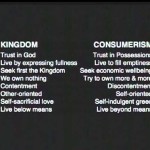We run our website the way we wished the whole internet worked: we provide high quality original content with no ads. We are funded solely by your direct support. Please consider supporting this project.
Cheap Grace and Consumer Christianity
The “cheap grace” Gospel sells well in America. We live in a culture of consumerism that conditions us to habitually look for “the best deal.” We’re more or less trained from birth to live in the question; “How can we get the most for the least?” We think this way about our houses, cars, clothes, food, entertainment, and (tragically) even sometimes our relationships. So it’s not surprising that many Americans are tempted to think this way about religion. We shop.
When the consumer mindset infects the Church, salvation begins to be viewed as a product that Christians are supposed to pedal – a “Salvation Amway” sort of thing. Christianity is reduced to a salvation-product franchise, and individual churches compete for a larger share in the religious consumer market. The salvation-product is offered for the price of a prayer, while fringe benefits are sometimes piled onto the offer to make it more attractive. (In the competitive world of religious consumerism, one must be clever!)
Though Jesus always warned about the heavy cost of following him, many salvation-product peddlers now promise that the salvation-product not only gives you guaranteed fire insurance, but also that it will make you wealthier and healthier and happier right now. All for the small price of a prayer. What a deal!
The trouble is, there is nothing about the consumerized Gospel that remotely resembles anything like the Good News proclaimed in the New Testament. It’s a tragic, grotesque, distortion of the Kingdom revolution Jesus came to establish. And at the base of it all, I suspect, is this legal transaction view of the atonement that I discussed in my last post.
You can see why I said earlier that thinking about the atonement is anything but a merely academic affair. It has huge practical consequences.
I ask you to start considering the possibility that when you accepted Jesus, you weren’t just cashing in on a legal-transaction two thousand years ago that gives you eternal fire insurance. You rather were trading in your civilian clothes for a military uniform. You weren’t signing up in the “wait-to-go-to-heaven-for-free club.” You were rather enlisting as a guerilla warrior in a subversive revolution. Yes, you’ll go to heaven. But that is a mere by-product of the transforming revolutionary life you surrendered to in the present.
If the main thing Jesus did centered on a legal transaction in heaven that took place when he died, then the main thing the Church is about is getting people to give mental ascent to this. The Church thus becomes mainly a religious society consisting of people who believe they are saved by believing Jesus gets them “off the hook.”
By contrast, if the main thing Jesus was about centered on overturning condemnation and overcoming evil by unleashing the unsurpassable power of self-sacrificial love—which I argue for in so much of what I write and preach—then the Church must be seen primarily as a community of people who do the same thing. In this view, we can’t even talk about what Jesus did for us without in the same breath talking about what Jesus is doing in us and through us.
Because of what Jesus did, we are being caught up into the reality of God’s conquest of evil through the power of self-sacrificial love. This reality is what Jesus identified as the Kingdom of God. The evidence that we’re being caught up into the Kingdom is not merely that we prayed “the sinners prayer,” but that we are beginning to individually and collectively manifest Jesus’ self-sacrificial love.
The Kingdom is not a legal-transaction kind of thing. It’s a caught-up-into-a-new-reality kind of thing.
This is why the New Testament stresses so strongly that we are united with Christ. Jesus identifies with us so that we may be identified with him (e.g. Rom. 6:1-8; Gal 2:17-21). His life, death and resurrection becomes our life, death and resurrection. Everything Jesus was about is what we are to be about, for we are, fact, united with him. This is also why Jesus not only takes up the cross for us, but also calls us to take up the cross in imitation of him (Mt 10:37-40, 16:21-28).
Imitating Jesus’ love, participating in Jesus’ love, identifying with Jesus’ love, and being transformed by Jesus’ love, is the essence of the Kingdom Jesus came to establish.
Category: General
Tags: Atonement, Consumerism, Kingdom Living, Penal Substitution View of Atonement
Topics: Atonement and The Cross, Following Jesus
Related Reading

Jesus and Democracy
Question: I’ve heard that the reason Jesus didn’t speak up on political issues was because he didn’t have the benefit of living in a democracy. Since we do, don’t we have a duty both to God and our country to be involved in politics? Answer: If the reason Jesus didn’t speak up on political issues…

The Wrong “Bulls-Eye”: Reflections on the “Christian Left”
As it has since the fourth century, the Church today for the most part operates with a Constantinian (“power-over”) paradigm. Because of this, most socially concerned Christians are inclined to define the Church’s mission as adjudicating between and tweaking political options “in Jesus’ name.” We accept Caesar’s definition of “power” as the ability to get…

The Incarnation: More Than a Rescue Mission
A mistake people often make concerning the Incarnation is that they fail to distinguish the eternal plan of God to unite himself with humanity in Christ, on the one hand, from the atoning significance this plan acquired after the fall, on the other. Some therefore think of the Incarnation as a sort of “Plan B”…

The “Kingdom Now”: Reflections on Magical American Christianity
One major problem American Christians face is that we tend to embrace a magical view of the Christian faith. We assume that if a person “prays the sinners prayer,” “surrenders their life to Christ,” and “accepts Jesus as Lord of their life,” this somehow magically “saves” them and will sooner or later magically transform them…

Consumer Wars: Sermon Clip
To go along with our other post today, here’s a clip from Greg’s sermon last week. If you don’t have any financial margin in your life, this might have something to do with it. You can find the entire sermon here.

Christian Utopia
Fergal of Claddagh, OP via Compfight A little meditation on Christian Utopia and the Body Politic as we stand poised on the eve of the election in America. We affirm that Jesus will indeed “establish His kingdom on earth” but it won’t come through the exercise of power. Rather, God’s kingdom will come as his…

